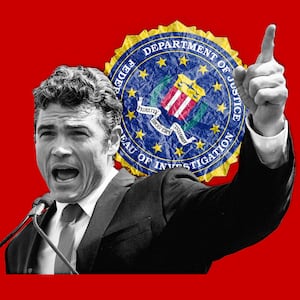Pay Dirt is a weekly foray into the pigpen of political funding. Subscribe here to get it in your inbox every Thursday.
Republican congressional candidate Joe Kent has tried to distance himself from a problematic adviser’s white nationalist ties. But the money trail suggests not only that the two men remain tight, but that they’re so close that the relationship may have crossed into a forbidden form of political incest.
A Daily Beast analysis of filings with the Federal Election Commission found potential overlap in payments between the Kent campaign and a super PAC that has backed his candidacy in both the 2022 and 2024 election cycles. Federal law bars such groups from coordinating.
FEC records also show that since August 2022, the campaign has routed the majority of its expenses through what legal experts said appears to be a shell company. The scheme has the effect of hiding the identities of who the campaign is ultimately paying, which the experts said could run afoul of disclosure rules.
The potential super PAC overlap involves top Kent aide and strident election denier Matt Braynard, a longtime adviser to the candidate who has spoken on the campaign’s behalf as recently as October. In the run-up to the 2022 election, Braynard’s documented ties to white nationalists contributed to a battery of negative press about Kent’s proximity to extremist groups.
At issue is whether the Kent campaign and super PAC have improperly coordinated—and whether Braynard ever took the mandated time required between his stint on the official campaign and his supposed role at the super PAC supporting Kent.
Kent, running in Washington state’s 3rd District, ultimately lost to Democratic Rep. Marie Gluesenkamp Pérez in 2022 by fewer than 3,000 votes. He’s challenging her again this cycle
Braynard told Talking Points Memo in September that he stopped working for the Kent campaign in November 2022. But that may coincide with another role Braynard took on.
According to FEC records, a company registered by Braynard’s wife at their shared address, called “QUB Consulting,” has received tens of thousands of dollars from the pro-Kent super PAC “Pacific Northwest Political Action Committee.” The payments started just days before the November 2022 election.
Federal law requires campaign staff and vendors to take a 120-day “cooling off” period before they can begin working with a super PAC. But it’s unclear if Braynard ever took that break—he was still fielding campaign comments one day after the super PAC paid QUB $22,000 for a text message blast—and it’s unclear if he ever stopped working for Kent.
A Google search returns campaign blog posts published in the last few months with metadata and source code showing Braynard’s byline—the most recent, announcing a fundraiser this month, posted on Dec. 16, 2023. One update even boasted about Kent dodging an FEC complaint, in which Braynard played a key role.
In a statement to The Daily Beast, Braynard didn’t deny that he wrote the blog posts on the Joe Kent for Congress site, but he asserted that he had “long volunteered my services” to the campaign.

Republican Congressional candidate Joe Kent speaks at a campaign event.
Photo by Nathan Howard/Getty ImagesBraynard’s statement also didn’t deny that the super PAC paid him through QUB. Instead, he attacked the “sexist” suggestion that his wife is incapable of running a political consulting firm—a suggestion The Daily Beast never made.
“It is reprehensible and sexist to suggest that my wife, who has spent ten years as an advisor to my own political consulting firm and as a newsroom manager for one of the largest media agencies in the world, is not capable of establishing and running her own political consulting firm completely independent of me,” Braynard said, adding that it was particularly “dehumanizing” considering that political consulting is “a field where women are already underrepresented and is dominated by Old Boys Club of political consultants.”
Braynard concluded with a legal threat, though he did not specify on what grounds he thought he could sue.
“Consider this due notice against any suggestions contrary; I’ve forwarded your email to attorneys who are prepared to act,” he said.
It’s unclear what political consulting firm Braynard’s wife advised for a decade. The far-right consultant’s Braynard Group doesn’t appear to be active, and FEC records show it received its last payments more than 10 years ago.
The Daily Beast could find no other company registered to Braynard, though he was paid at least $190,000 as a consultant to testify in four states on vanquished President Donald Trump’s behalf about unfounded claims of widespread irregularities in the 2020 election. He also reportedly took on an analyst role with the Trump campaign after its defeat..
Braynard’s wife has never appeared in FEC payment records. In September 2022, she was apparently wrapping up her master’s thesis in computer science at Stockholm University. Her LinkedIn profile indicates she has worked on the business side of Agence France-Presse (AFP) full-time since 2021, when she left her newsroom associate position. Her current role is commercial operations manager.
The PAC’s first payment to QUB, in November 2022, came when her page shows she worked as the French news agency’s business operations manager, just months before a promotion to her present position.
AFP would only tell The Daily Beast that Braynard’s wife had never worked there “in any editorial capacity”—where it maintained it upholds “strict editorial standards policies.” Braynard told The Daily Beast his spouse is now on maternity leave, but would not answer whether that leave extended to QUB.
More to the point, QUB was not paid for general political consulting, but specifically for the pre-election communications, along with fundraising services—$5,000 in November 2022 and another $30,000 in February 2023, FEC records show.
In all, QUB has received $64,000 from the super PAC, about $10,000 more than all its other expenses combined.
Braynard would not say how it came about that the pro-Kent super PAC was the only entity ever to hire QUB, or how the company and the committee got connected in the first place. And he never denied running the company or receiving the payments.
Campaign finance experts said the super PAC and shell company arrangements both raise legal concerns regarding potentially unlawful coordination and disclosure violations.
The pro-Kent super PAC, Pacific Northwest, pays two firms at a Post Office box in Hudson, Wisconsin. That box belongs to Tom Datwyler—the campaign and super PAC’s shared treasurer—whose accounting firm, 9Seven Consulting, takes payments at the same location. Datwyler also happens to use that address for dozens of state and federal committees whose books he manages, including in the FEC registration documents for Pacific Northwest.
The other firm the super PAC paid at Datwyler’s Hudson address is QUB Consulting. However, business records reveal that the company is in reality based in Virginia. The incorporation documents list a Fairfax County address from which Braynard has made campaign donations in the past, even though his wife’s name is the only one on the filing.
It’s unclear why QUB’s payments were routed to Datwyler’s address—a question which also arose over his work for Rep. George Santos (R-NY). Datwyler did not respond to repeated phone and email requests for comment.
Datwyler has handled the bag for Braynard more than once. Since 2021, he’s served as treasurer of Braynard’s Look Ahead America nonprofit, a group that has endeavored to recast Trump supporters jailed for their participation in the bloody rampage through the Capitol on Jan. 6, 2021, as “political prisoners.”
Earlier this year, the duo teamed up again to form Save Our Orange County, a group dedicated to fighting the Wilderness Crossing development planned a little more than an hour south of D.C.
Saurav Ghosh, director of federal reform at nonprofit watchdog Campaign Legal Center, told The Daily Beast that the overlap suggests impermissible coordination between the campaign and the super PAC.
“If this company [QUB] is Braynard and he was serving as campaign staffer, it’s hard to imagine he could do that without running afoul of campaign finance rules,” Ghosh said.
Ghosh noted that this rule is in place because campaign insiders—especially at the senior level—have access to nonpublic information, like internal strategy, messaging, and operations. That knowledge would be extremely valuable to a super PAC trying to support that candidate, especially in communications close to an election.
“If they just take that information over to a super PAC, they’re essentially an agent of the campaign or the candidate,” he said. “They’re acting with knowledge of what both the campaign and the super PAC are doing, when those committees are required to operate independently of each other.”
Brendan Fischer, an expert in campaign finance law and deputy executive director at watchdog Documented, highlighted the proximity of the super PAC’s first QUB payments to the 2022 election. Those payments—$22,000 for a pro-Kent text message blast on Nov. 3, with another $7,000 in texts on Nov. 8, Election Day—weren’t for general consulting work; they were independent expenditures for election communications supporting Kent and attacking his rival.
“It’s hard to see how a staffer could move over to a super PAC at the height of the campaign and not be providing key inside information,” Fischer told The Daily Beast.
Pointing to the text message payments, Fischer explained that the issue of coordinated communications—and therefore an in-kind contribution—arises when an outside group like a super PAC pays a shared vendor or agent of the campaign in relation to a communication about a candidate. The 120-day “cooling off” rule would seem to eliminate wiggle room for Braynard, he said.
However, Fischer said, the coordination rule strictly applies to payments from the super PAC side.
It’s unclear whether the Kent campaign has paid Braynard, either this year or for most of the 2022 election, when he worked on the campaign. The last direct disbursement to the consultant came in May 2021, according to FEC filings, and it’s unknown whether or how he was compensated for his work since then. He continued to represent the campaign, including in correspondence with The Daily Beast, almost all the way to Election Day, despite the FEC filings not showing a single cent rolling in his direction.
But that doesn’t mean Braynard hasn’t gotten any money from the campaign at all. The Kent operation has routed the vast majority of its expenses—about two of every three dollars spent—through an apparent shell company, called “HWY 99 Corporation.” And Braynard did not deny having ever gotten money from this entity when The Daily Beast pressed him, but only alluded vaguely to having “long volunteered” for the campaign.
Campaign finance experts told The Daily Beast that HWY 99—registered in Delaware under the name of a nondescript corporate agent—appears to function as a master payer. The pass-through entity obscures the identities of the true payees, including campaign vendors and possibly even staffers. These experts said the whole arrangement raises concerns about disclosure rules, as well as the campaign’s transparency with voters.
It’s unclear who exactly is behind HWY 99. The company is only associated with Kent’s political committees, and no other committee has ever paid it, according to FEC records. As of the most recent filings, covering through late September, the company had siphoned more than $1.3 million from the Kent operation—about two-thirds of its total spending. The payments were ascribed to a wide range of services, from “media placement” to “digital consulting” to “legal and campaign consulting” to the catch-all “printing, billboards, campaign consulting, and fundraising consulting.”
Legal experts expressed concerns about the HWY 99 setup.
“The company appears to be a shell,” said Ghosh, of CLC. “Here you have an entity that was recently set up, no other campaigns pay it, and you can’t trace it, which all points to an effort to conceal something.”
Named for a state route coursing along the Pacific coastline, the company appears in Kent campaign filings as “HWY 99 Corporation” and as “HWY 99 LLC.” But while HWY 99 is registered in Delaware, it accepts the campaign’s payments at a different address: 499 South Capitol Street SW, suite #405, Washington, D.C.
Multiple entities registered to Datwyler—the treasurer to both the campaign and the super PAC—have previously used that precise address: the nonprofit Great American Coalition; his 9Seven Consulting; multiple state and federal campaigns for which he has served as treasurer; and a group called New Journey PAC, which operates the websites MagaWomen.Org and Maga.Black.
Experts said that the arrangement has parallels to a similar payment structure that Donald Trump’s campaign deployed in 2020, where nearly $700 million went to a single shell entity called “American Made Media Consultants,” hiding who the campaign was ultimately paying.
Those payments drew a complaint from Ghosh’s group, CLC, which prompted the FEC’s general counsel to find that the campaign had likely broken the law. The FEC’s Republican commissioners declined to investigate, however, in a controversial decision along party lines. (CLC sued the FEC over the ruling. Just months earlier, the conservative commissioners had sided against Hillary Clinton’s campaign over the same issue.)
Fischer pointed out another parallel, involving a complaint against Antone Melton-Meaux, a Democrat who used a shell spending scheme when he challenged Rep. Ilhan Omar (D-MN) in the 2020 primary. In that case, the FEC commissioners found 4-2 that the scheme violated transparency rules, but they were forced to dismiss the matter after the retirement of one of those four commissioners.
“The law requires that candidates and outside groups itemize their expenses, and the public has a right to know who’s working for the candidate and how a campaign is spending its money,” Fischer said, noting that with Kent in particular, and his past ties, transparency is even more paramount. “Voters in his district would probably want to know who Kent is surrounding himself with and paying, and this scheme undermines that ability.”
But Braynard is hardly the only staffer missing from the Kent campaign’s expense reports. In donations made last cycle, the candidate’s live-in fiancée, Heather Kaiser—now Kent’s wife—identified her employer as “Joe Kent for Congress” and her title as “campaign manager.” But FEC records reveal no payments to Kaiser—a contributor to the pro-Kremlin (and pro-Kent) conspiracy blog The Grayzone—for her senior-level work.
In fact, the Kent campaign has reported only one “payroll” or “salary” expense ever—a $5,000 disbursement in July 2021 to former campaign manager Byron Sanford.
Sanford’s other Kent payouts, like many of the campaign’s advisers, were chalked up to the outside role of “campaign consulting.” Sanford later turned on Kent, claiming that the right-wing candidate’s personal funds came from a shady company for a no-show job. (Kent loaned his 2022 campaign $205,000, and as of last September has not repaid any of it.)
After reviewing the HWY 99 arrangement, Jordan Libowitz, communications director for watchdog Citizens for Responsibility and Ethics in Washington, concluded that “it’s hard not to see this company as a pass-through.”
“If you know where the money is going, that needs to be disclosed on FEC forms. You can’t hide staffers by paying someone else to pay them,” Libowitz told The Daily Beast. “If there’s a reasonable, easy explanation for this, the campaign will give it to you. If they can’t, there’s a reason they can’t.”
Asked for comment, the Kent campaign declined to provide such a reason.
In a 204-word statement, the campaign criticized his opponent’s voting record, and claimed that the “baseless accusations” about HWY 99 were designed to “distract from Joe gaining ground in the election.”
“Our campaign has previously faced phony claims that were published by zero accountability publications like the Daily Beast that later ignored the FEC ruling that fully vindicated our campaign and our candidate,” the statement said.
(The Daily Beast wrote up the FEC decision that, by a vote of 4-2, the agency had found “insufficient evidence” to back up Sanford’s allegations that Kent held a no-show job.)
The campaign further claimed that “all campaign practices the Daily Beast raises have not only been codified as legitimate by the FEC, but are commonplace among other campaigns, including Marie Perez’s which has escaped their scrutiny. Many people hold titles and roles within this campaign as volunteers without compensation.”
The Daily Beast reviewed Gluesenkamp Pérez’s expenses and did not find evidence to support the campaign’s allegation. But the two examples aren’t similar. Unlike Kent’s HWY 99, Gluesenkamp-Perez’s top vendors are known firms that contract with a number of other political committees, and her campaign lists several employees who draw a salary.
The statement called The Daily Beast’s observation that Kent’s wife received no payments as his campaign manager “particularly reprehensible.” She “worked entirely in a volunteer capacity and has only been reimbursed for campaign-related expenses,” the statement said.
Kent is no stranger to shadowy firms. In numerous filings and personal appearances in 2021 and 2022, he reported working for a Virginia business called “American Enterprise Services,” which he claimed worked with “5G conversion type of stuff” and “proprietary software.” However, The Daily Beast discovered no company of this description existed.
In response, Kent claimed he “screwed up” the name of the firm paying his six-figure income, and released documents showing he had in fact worked for a company called “Advanced Enterprise Solutions.” The exact operations of this entity remain murky, and Sanford has insisted it was a no-show position.
Although the FEC ultimately found “insufficient evidence” to support that allegation, two commissioners voted in the minority. The ruling prompted Braynard to crow victory in a post on the Joe Kent for Congress webpage.
But even in triumph, the campaign couldn’t get the name of the company the candidate worked for right.
“We are grateful to the FEC for its investigation that concluded Joe was gainfully employed by American Enterprise Solutions,” the press release read.









